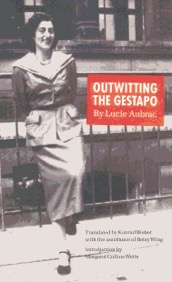 $9.99 on Kindle
$9.99 on KindleOutwitting the Gestapo by Lucie Aubrac (translated from the French Ils partiront dans l'ivresse by Konrad Bieber with the assistance of Betsy Wing; 93,000 words, 7 illustrations)
Lucie Aubrac (1912-2007), born Bernard into a Catholic family of winegrowers, was teaching history in a Lyon high school and newly married to Raymond Samuel, a Jewish engineer, when World War II broke out and divided France. The couple, living in the Vichy zone, soon joined the Resistance movement in opposition to the Nazis and their collaborators. Outwitting the Gestapo is Lucie’s harrowing account of her participation in the Resistance: of the months when, though pregnant, she planned and took part in raids to free comrades — including her husband, under Nazi death sentence — from the prisons of Klaus Barbie, the infamous Butcher of Lyon. Her book is also the basis for the 1997 French movie, Lucie Aubrac, which was released in the United States in 1999.
The translator, Konrad Bieber, is an emeritus professor of French and comparative literature at SUNY, Stony Brook, and a survivor of Nazi Terror. The introducer is Margaret Collins Weitz, professor of humanities and languages at Suffolk University in Boston.
“A breathtaking account that feeds the soul as much as it satisfies the appetite for vicarious danger.” — Kirkus Reviews
“Lively and absorbing... [Aubrac's] book interweaves the everyday experience of incredibly hard times... with Resistance activities.” — London Review of Books
“There is a relish for the idiosyncratic ramifications of human character that reveal themselves in crisis... As the record of a female résistante’s exploits, Aubrac’s account is doubly valuable. [There is] a compelling sense of immediacy as events unfold.” — Washington Post Book World
“An excellent historical introduction on the Resistance movement... and an appropriately taut translation... enhance the impact of this stirring tale of heroism, which concerns not only Resistance members but ordinary citizens, notably women.” — Publishers Weekly
“This book is riveting. Adventure, terror, horror, and excitement are all here; it is a feminist class as well... full of interesting information about wartime food, clothes, schooling and manners. It is also a sturdy tale of married love, sustained and requited. The translation is so good that it reads as if it had been written in English.” — Times Literary Supplement
“In Ils partiront dans l'ivresse, we find the whole Lucie Aubrac with her candor, spontaneity and narrative art... But these are not the only qualities of the book: it exudes a spirit of solidarity among all résistants... and a great respect for the humble people who at one time or another assisted the Resistance without belonging to it. All in all, an extraordinary testimony by an extraordinary woman.” — Claude Lévy, Vingtième Siècle, revue d'histoire



